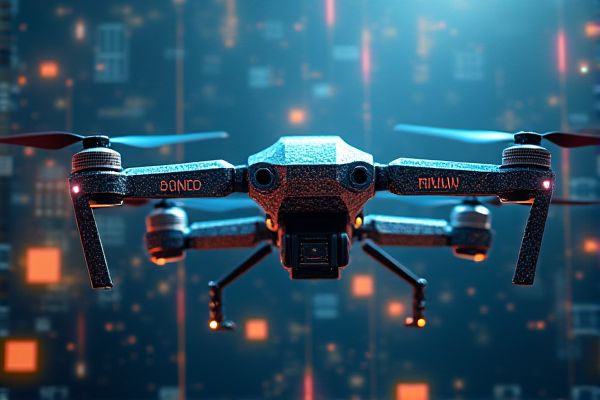
AI enhances aeronautics by enabling advanced data analysis, optimizing flight operations, and improving safety protocols. Predictive maintenance systems powered by AI can anticipate equipment failures before they occur, reducing downtime and maintenance costs. Machine learning algorithms analyze vast amounts of flight data to optimize routes and fuel consumption, contributing to more sustainable aviation practices. Autonomous systems, including drones and urban air mobility vehicles, utilize AI for navigation and obstacle avoidance, paving the way for new innovations in transportation.
AI usage in aeronautics
Autonomous Flight Systems
AI in aeronautics enhances the efficiency and safety of Autonomous Flight Systems. These systems use algorithms to optimize flight paths, potentially reducing fuel consumption and operational costs. Opportunities for real-time data processing can improve decision-making during flights, thus enhancing passenger safety. Companies like Boeing are exploring these advancements to maintain a competitive edge in the evolving aerospace industry.
Air Traffic Management
AI can significantly enhance air traffic management by improving efficiency and safety. For instance, integrating machine learning algorithms can optimize flight schedules, reducing delays and fuel costs. Predictive analytics can identify potential hazards, allowing for proactive measures to ensure flight safety. The use of AI in aeronautics offers the possibility of more streamlined operations at institutions like NASA, enhancing both user experience and operational performance.
Predictive Maintenance
AI in aeronautics offers potential advantages in predictive maintenance by analyzing vast amounts of data from aircraft systems. For instance, airlines like Delta Airlines could minimize downtime and reduce operational costs through early detection of mechanical issues. Predictive algorithms can forecast component failures, allowing for timely maintenance scheduling. This not only enhances safety but also improves overall efficiency in fleet management.
Fuel Efficiency Optimization
AI integration in aeronautics offers significant potential for fuel efficiency optimization. By analyzing flight data from airlines like Delta, AI can identify patterns that lead to reduced fuel consumption. Advanced algorithms can optimize flight paths and reduce unnecessary weight, improving overall efficiency. The possibility of decreased operational costs presents a clear advantage for the aviation industry.
Flight Path Optimization
AI can enhance flight path optimization by analyzing vast amounts of data to identify the most efficient routes. Such optimization reduces fuel consumption and minimizes flight times, benefiting airlines like Delta Air Lines. This technology also allows for real-time adjustments based on weather patterns and air traffic, increasing safety and reliability. As a result, the aviation industry can lower operational costs while improving overall service quality.
Noise Reduction Strategies
AI has the potential to enhance noise reduction strategies in aeronautics by optimizing aircraft design and flight operations. Machine learning algorithms can analyze flight data to identify and mitigate noise sources, improving compliance with regulations set by organizations like the FAA. The implementation of such technologies could lead to quieter urban environments around airports. Innovations in AI-driven predictive maintenance may also contribute to more efficient operations, further reducing noise impact.
Weather Prediction and Analysis
AI can enhance aeronautics by optimizing flight paths and improving safety through predictive maintenance. In weather prediction, AI algorithms analyze vast datasets to provide more accurate forecasts, benefiting sectors like aviation. For example, institutions like NASA leverage AI to simulate atmospheric conditions and improve climate models. This integration holds the potential to reduce operational costs and increase efficiency across various domains.
Pilot Assistance Technologies
Pilot assistance technologies in aeronautics enable enhanced decision-making and situational awareness for pilots. These systems, such as automated navigation aids, can significantly reduce workload during complex flight operations. Implementing AI-driven solutions might lead to improved safety outcomes and efficient fuel usage. For instance, companies like Boeing are exploring advanced AI systems that could streamline flight operations and enhance overall pilot performance.
Passenger Experience Enhancement
AI applications in aeronautics can significantly enhance passenger experience by personalizing services and streamlining operations. For instance, airlines like Delta Air Lines utilize AI-driven systems to predict flight delays, providing timely notifications to passengers. Improved baggage handling through AI technology can reduce lost luggage incidents, further increasing passenger satisfaction. The potential for AI to analyze passenger feedback and preferences offers airlines an opportunity to tailor their offerings and improve overall customer loyalty.
Safety and Risk Management
AI applications in aeronautics can enhance safety and risk management by improving predictive maintenance and flight operations. For instance, algorithms can analyze data from various sensors in real-time to identify potential mechanical failures before they occur. Utilizing AI-driven simulations can also help in understanding complex scenarios, thereby allowing for better preparation and response strategies. The integration of AI within institutions like NASA could lead to more efficient safety protocols and reduced operational risks.
 techknowy.com
techknowy.com